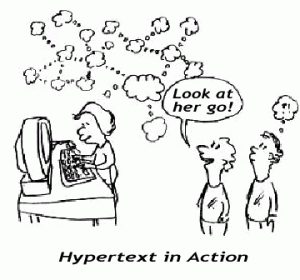I always opt to print out my readings because I personally don’t like looking at a computer screen the whole day. But from the first line knowing that the reading was in non-sequential order would have be easier to follow through as an online reading with links to the other chapters. Later in the reading Nelson writes that is it “best read at an interactive screen” which linked up with my thoughts at the start.
It is almost a choose your own adventure book. Where you flip back and forth till you make it to the end or wherever you want to end up. You don’t follow the traditional from the beginning to the end even though it is a book/reading which is quite different.
It was written a while ago so I found it funny how the author thought that we might be extinct by 2020. Writing in 2014, I think we will make it. Also, many of his “hopes” for 2020 have come true to an extent. His hopes arise from the benefits we will get from sharing information with others. Like the globalization of information and resources. The structure is that there is no structure or order. Rather an interactive playground for ideas to roam, be found or created.
I thought it was clever how they used the form of the reading involving hypertexts to really illustrate and support their discussion. You are not only thinking about their points but also seeing hypertext in action as you read.
Extract from: Nelson, Theodor Holm. Literary Machines 91.1: The Report On, and Of, Project Xanadu Concerning Word Processing, Electronic Publishing, Hypertext, Thinkertoys, Tomorrow’s Intellectual Revolution, And Certain Other Topics Including Knowledge, Education and Freedom. Sausalito: Mindful Press, 1992.
